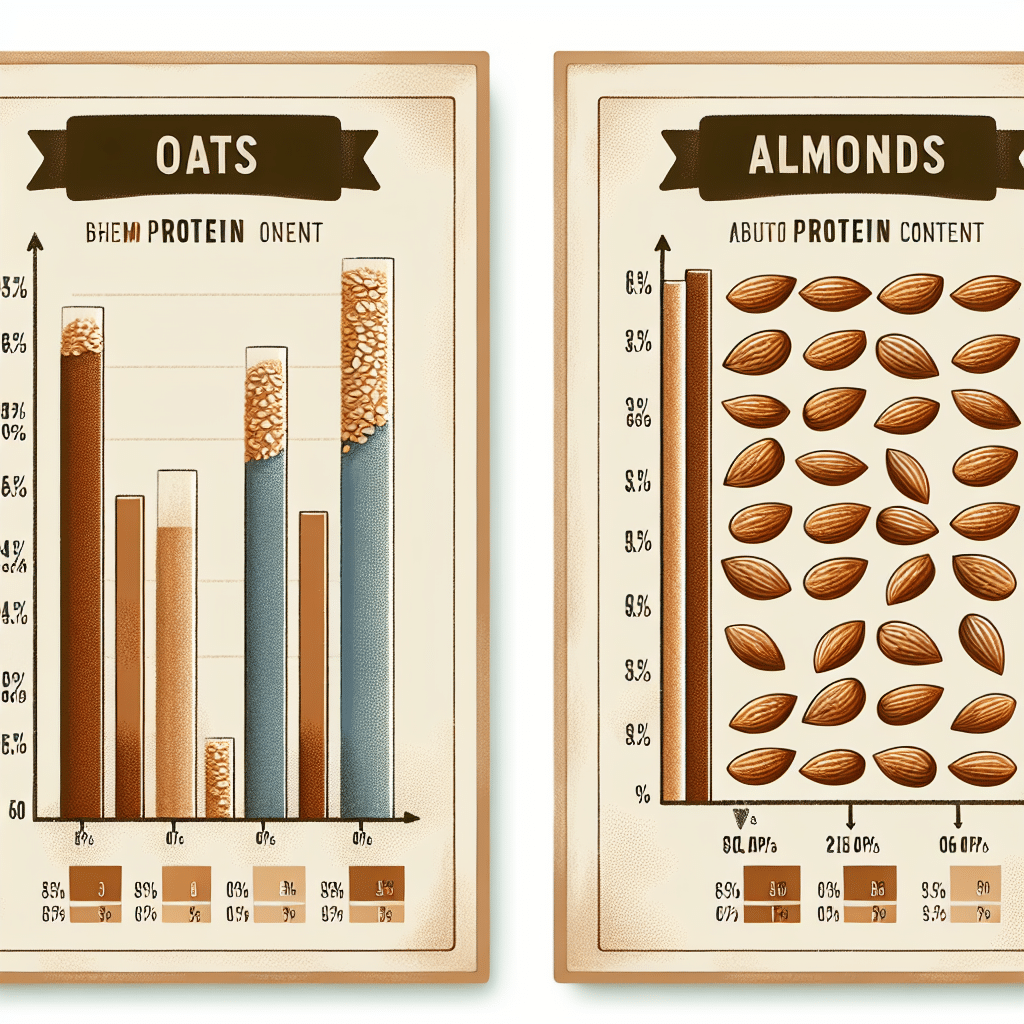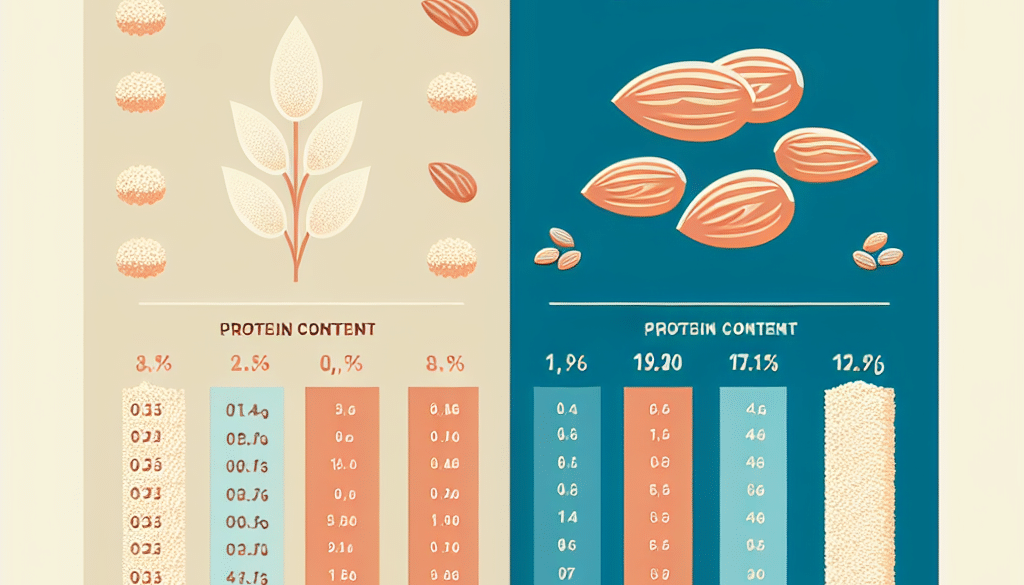Does Oat Or Almond Have More Protein?
-
Table of Contents
- Oat vs. Almond: Which Has More Protein?
- Understanding Protein in Oats and Almonds
- Protein Content in Oats
- Protein Content in Almonds
- Comparing Oat and Almond Protein
- Nutritional Benefits Beyond Protein
- Oats: A Fiber Powerhouse
- Almonds: Rich in Healthy Fats and Vitamins
- Practical Considerations for Dietary Choices
- Conclusion: Balancing Oats and Almonds in Your Diet
- Discover ETprotein’s High-Quality Protein Products
Oat vs. Almond: Which Has More Protein?

When it comes to plant-based proteins, consumers often find themselves comparing different sources to determine which is best suited for their dietary needs. Two popular options that frequently come up in such discussions are oats and almonds. Both are staples in a health-conscious individual’s pantry, but when it comes to protein content, which one comes out on top? This article delves into the nutritional profiles of oats and almonds, comparing their protein content and discussing other health benefits they offer.
Understanding Protein in Oats and Almonds
Protein is a crucial macronutrient necessary for building and repairing tissues, making enzymes and hormones, and supporting overall health. Both oats and almonds contain protein, but they differ in amounts and the type of protein they offer.
Protein Content in Oats
Oats are a whole grain known for their high fiber content and various health benefits. They are also a decent source of protein. A typical serving of oats, which is about half a cup of dry oats, contains approximately 5-7 grams of protein. This protein is considered high quality because it contains a good balance of amino acids, although it is not complete as it lacks sufficient amounts of some essential amino acids.
Protein Content in Almonds
Almonds are a type of tree nut celebrated for their nutrient density. A one-ounce serving of almonds, roughly a handful or 23 almonds, provides about 6 grams of protein. Almonds contain a higher proportion of essential amino acids compared to oats, making their protein of slightly higher quality.
Comparing Oat and Almond Protein
When directly comparing the protein content of oats and almonds, it’s important to consider the serving size and the context in which they are consumed. Here’s a breakdown:
- Per Serving: A one-ounce serving of almonds contains slightly less protein than a half-cup serving of dry oats. However, almonds have a higher protein density, meaning they provide more protein per calorie than oats.
- Protein Quality: Both oats and almonds lack some essential amino acids, but almonds come closer to providing a complete protein profile.
- Usage in Diet: Oats are often consumed as a carbohydrate source with added protein, while almonds are typically used as a protein and healthy fat source.
Nutritional Benefits Beyond Protein
While protein content is an important factor to consider, both oats and almonds offer a range of other nutritional benefits that contribute to their overall health value.
Oats: A Fiber Powerhouse
Oats are particularly high in soluble fiber, especially beta-glucan, which has been shown to reduce cholesterol levels and support heart health. They also provide a good source of vitamins and minerals, including manganese, phosphorus, magnesium, copper, iron, zinc, folate, and B vitamins.
Almonds: Rich in Healthy Fats and Vitamins
Almonds are an excellent source of monounsaturated fats, which are associated with reduced risk of heart disease. They also contain vitamin E, magnesium, and potassium, and are a good source of antioxidant flavonoids.
Practical Considerations for Dietary Choices
Choosing between oats and almonds for protein intake often comes down to dietary preferences and goals. Here are some practical considerations:
- Meal Planning: Oats are typically consumed at breakfast, while almonds are versatile enough to be eaten as a snack, added to salads, or used in various recipes throughout the day.
- Caloric Intake: Almonds are calorie-dense due to their high fat content, so portion control is important for those watching their calorie intake.
- Dietary Restrictions: Those with nut allergies may opt for oats as a safe protein source, while those on a gluten-free diet should ensure their oats are certified gluten-free.
Conclusion: Balancing Oats and Almonds in Your Diet
In conclusion, both oats and almonds offer valuable protein content along with a host of other nutritional benefits. While almonds have a higher protein density, oats provide a larger volume of protein per serving. The best choice depends on individual dietary needs, preferences, and restrictions. Incorporating both into a balanced diet can provide a well-rounded intake of protein, fiber, healthy fats, vitamins, and minerals.
Discover ETprotein’s High-Quality Protein Products
If you’re looking to enhance your protein intake with high-quality, plant-based options, consider exploring ETprotein’s range of products. ETprotein specializes in organic bulk vegan proteins that cater to various dietary needs and preferences. Their offerings include organic rice protein, pea protein, and unique options like watermelon seed protein, all characterized by a neutral taste and non-GMO, allergen-free attributes.
For those seeking a diverse source of protein to complement their intake from oats and almonds, ETprotein’s products are an excellent choice. With a commitment to purity and quality, ETprotein ensures that you receive the best plant-based proteins to support your health and wellness goals.
About ETprotein:
ETprotein, a reputable protein and L-(+)-Ergothioneine (EGT) Chinese factory manufacturer and supplier, is renowned for producing, stocking, exporting, and delivering the highest quality organic bulk vegan proteins and L-(+)-Ergothioneine. They include Organic rice protein, clear rice protein, pea protein, clear pea protein, watermelon seed protein, pumpkin seed protein, sunflower seed protein, mung bean protein, peanut protein, and L-(+)-Ergothioneine EGT Pharmaceutical grade, L-(+)-Ergothioneine EGT food grade, L-(+)-Ergothioneine EGT cosmetic grade, L-(+)-Ergothioneine EGT reference grade and L-(+)-Ergothioneine EGT standard. Their offerings, characterized by a neutral taste, non-GMO, allergen-free attributes, with L-(+)-Ergothioneine purity over 98%, 99%, cater to a diverse range of industries. They serve nutraceutical, pharmaceutical, cosmeceutical, veterinary, as well as food and beverage finished product distributors, traders, and manufacturers across Europe, USA, Canada, Australia, Thailand, Japan, Korea, Brazil, and Chile, among others.
ETprotein specialization includes exporting and delivering tailor-made protein powder and finished nutritional supplements. Their extensive product range covers sectors like Food and Beverage, Sports Nutrition, Weight Management, Dietary Supplements, Health and Wellness Products, and Infant Formula, ensuring comprehensive solutions to meet all your protein needs.
As a trusted company by leading global food and beverage brands and Fortune 500 companies, ETprotein reinforces China’s reputation in the global arena. For more information or to sample their products, please contact them and email sales(at)ETprotein.com today.














